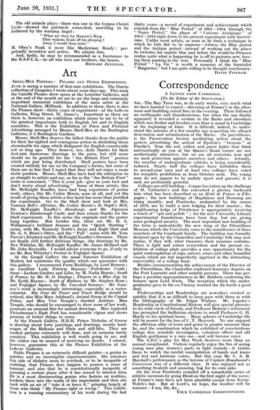Correspondence
A LETTER FROM CAMBRIDGE.
[To the Editor of the SPECTATOR.] SIR—The May Term was, in its early weeks, very much what we have learned to expect—shivering at Fenner's in the after- noon and huddling round fires in the evening. There followed an earthquake and thunderstorms, but when the sun finally appeared, it revealed a verdure in the Backs and elsewhere which was fresher and lovelier even than is usual in Cambridge at the beginning of June. It is difficult, indeed, to under- stand the outcries of a few months ago respecting the alleged desecration and urbanization of the Backs. (In parentheses, is the Preservation Society meditating action about the posters advertising the arrival of Epstein's " Genesis " at Finella?) True the red, yellow and green lights that blink automatically at you at the Queen's Road corner are not aesthetically attractive, but we are all motorists now and we need protection against ourselves and others. Actually, the number of undergraduate vehicles is being considerably reduced. Nearly half the colleges have forbidden them to second-year men and at least two colleges have voted for complete prohibition as from October next. The young men do not appear to be unduly upset and parents, it is said, are profoundly grateful.
Colleges are still building : Corpus has taken up the challenge of St. Catharine's and has converted a gloomy backyard into what has been described as an Hotel de France et d'Es- pcigne ; the new buildings of Magdalene and Downing are rising steadily, and Pembroke, undaunted by the omens of 1870, are to build a new lodging for their master ; the neighbouring lodge of Peterhouse is appropriately receiving a touch of spit and polish " ; for the new University Library experimental foundations have been dug, but are giving some geological anxiety. The most important new building of the term is undoubtedly the new wing of the Fitzwilliam Museum which the University owes to the munificence of three members of the Courtauld family. The building was formally declared open by the Chancellor, and Cambridge folk may now realize, if they will, what treasures their museum contains. There is light and colour everywhere and the present ex- hibition of college plate provides a rare opportunity for the quiet contemplation of cups, salvers, ewers and other beautiful vessels which are but imperfectly apprised in the distracting conviviality of a college feast.
Besides commemorating the achievement of the Director of the Fitzwilliam, the Chancellor conferred honorary degrees on the Poet Laureate and other notable persons. There was per- haps a peculiar appropriateness in Mr. Baldwin conferring the honour upon Lord Irwin. The reception which the under- graduates gave to the ex-Viceroy worried the die-hards a good deal.
Professorships and Readerships are nowadays created so quickly that it is as difficult to keep pace with them as with the bibliography of Mr. Edgar Wallace. Mr. Lapsley's Readership in Constitutional History will give special pleasure to his wide circle of friends, and Professor Hobson's retirement has prompted the Sadleirian electors to recall Professor G. H. Hardy to his spiritual home. Many spheres of Cambridge life will be poorer for the loss of C. T. Heycock. No one enjoyed the affection alike of town and gown in greater measure than he, and the combination which he exhibited of conscientious college don, scientific investigator, volunteer officer and old English gentleman is a rare one—and will become rarer.
The A.D.C.'s play for May Week deserves more than an
annual compliment. Visitors regularly enjoy the fun of seeing young men play women's parts in light comedy—it tickles them to watch the careful manipulation of hands and knees and feet and baritone voices. But this year Mr. C. A. B. Marshall's performance as the heroine of Captain Brassbound's Conversion was of a different class. It was enjoyed not as something freakish and amusing, but for its own sake.
On the river Pembroke rounded off a remarkable series of
athletic successes by going Head on the first night of the races ; at Fenner's runs have not been plentiful except from Kemp- Welch's bat. But at Lord's, we hope, the weather will be warmer. —I am, Sir, &e., .
iOUR CAMBRIDGE CORRESPONDENT.










































 Previous page
Previous page